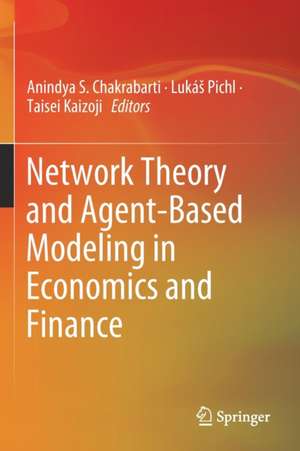Network Theory and Agent-Based Modeling in Economics and Finance
Editat de Anindya S. Chakrabarti, Lukáš Pichl, Taisei Kaizojien Limba Engleză Paperback – 4 noi 2020
This book presents the latest findings on network theory and agent-based modeling of economic and financial phenomena. In this context, the economy is depicted as a complex system consisting of heterogeneous agents that interact through evolving networks; the aggregate behavior of the economy arises out of billions of small-scale interactions that take place via countless economic agents. The book focuses on analytical modeling, and on the econometric and statistical analysis of the properties emerging from microscopic interactions. In particular, it highlights the latest empirical and theoretical advances, helping readers understand economic and financial networks, as well as new work on modeling behavior using rich, agent-based frameworks.
Innovatively, the book combines observational and theoretical insights in the form of networks and agent-based models, both of which have proved to be extremely valuable in understanding non-linear and evolving complex systems. Given its scope, the book will capture the interest of graduate students and researchers from various disciplines (e.g. economics, computer science, physics, and applied mathematics) whose work involves the domain of complexity theory.
| Toate formatele și edițiile | Preț | Express |
|---|---|---|
| Paperback (1) | 734.75 lei 6-8 săpt. | |
| Springer Nature Singapore – 4 noi 2020 | 734.75 lei 6-8 săpt. | |
| Hardback (1) | 740.91 lei 6-8 săpt. | |
| Springer Nature Singapore – 4 noi 2019 | 740.91 lei 6-8 săpt. |
Preț: 734.75 lei
Preț vechi: 896.04 lei
-18% Nou
Puncte Express: 1102
Preț estimativ în valută:
140.60€ • 147.09$ • 116.79£
140.60€ • 147.09$ • 116.79£
Carte tipărită la comandă
Livrare economică 03-17 aprilie
Preluare comenzi: 021 569.72.76
Specificații
ISBN-13: 9789811383212
ISBN-10: 9811383219
Pagini: 458
Ilustrații: VI, 458 p. 144 illus., 119 illus. in color.
Dimensiuni: 155 x 235 mm
Greutate: 0.65 kg
Ediția:1st ed. 2019
Editura: Springer Nature Singapore
Colecția Springer
Locul publicării:Singapore, Singapore
ISBN-10: 9811383219
Pagini: 458
Ilustrații: VI, 458 p. 144 illus., 119 illus. in color.
Dimensiuni: 155 x 235 mm
Greutate: 0.65 kg
Ediția:1st ed. 2019
Editura: Springer Nature Singapore
Colecția Springer
Locul publicării:Singapore, Singapore
Cuprins
Research on loss absorption of financial group (bank network).- The Mathematics of Human Contact.- Does it still matter in the new world where a refugee comes from? - Social network, Shocks, and Ethnicity - A multi-level analysis.- The Transferability of Human Capital, the Brain Drain, and the Brain Gain.- Evolution in Anonymous Population Games with Multiple Types.- Analysis of search actions on the Internet including the effect of blog and Twitter using Sociophysics approach.- Statistical analysis of a political demonstration using location-based big data.- Different Type of Interaction Plays a Role of Decision Error on Collective Behavior.- A financial network approach to unconventional monetary policy assessment - the case of Quantitative Easing in the euro area.- From Housing Locale Theory to Agent-Based Modeling Approach.
Notă biografică
Anindya S. Chakrabarti, Indian Institute of Management Ahmedabad
Lukas Pichl, International Christian University
Taisei Kaizoji, International Christian University
Textul de pe ultima copertă
This book presents the latest findings on network theory and agent-based modeling of economic and financial phenomena. In this context, the economy is depicted as a complex system consisting of heterogeneous agents that interact through evolving networks; the aggregate behavior of the economy arises out of billions of small-scale interactions that take place via countless economic agents. The book focuses on analytical modeling, and on the econometric and statistical analysis of the properties emerging from microscopic interactions. In particular, it highlights the latest empirical and theoretical advances, helping readers understand economic and financial networks, as well as new work on modeling behavior using rich, agent-based frameworks.
Innovatively, the book combines observational and theoretical insights in the form of networks and agent-based models, both of which have proved to be extremely valuable in understanding non-linear and evolving complexsystems. Given its scope, the book will capture the interest of graduate students and researchers from various disciplines (e.g. economics, computer science, physics, and applied mathematics) whose work involves the domain of complexity theory.
Caracteristici
Points out how network theory and agent-based modeling are becoming very influential in economics literature Explains that financial and economic networks have huge policy implications in stabilizing economic fluctuations Shows how to use an integrative framework to link the behavior of the parts to the behavior of the economy as a whole
